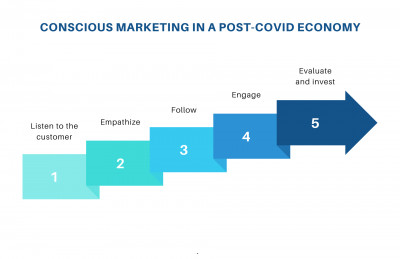Conscious Marketing in a Post-COVID Economy
Authored by Shriram Poonja, Chief Growth officer, CACTUS.
The pandemic has changed life, as we know it—our priorities have shifted, professional routines have changed, and spending capacities have lowered. This has resulted in changing purchasing patterns and consumer expectations. Organizations across industries have responded differently to this change—some have managed this change effectively while others have failed to keep their heads above water.
Shriram Poonja, Chief Growth Officer at Cactus Communications, discusses how circumstances such as these can influence marketing strategy or the way it is executed, but they cannot change basic marketing fundamentals.
Also read: Innovate, evolve, acclimatise to beat COVID-19 impact: Minal Srivastava
In my career as a marketer, I had never witnessed global upheaval, the kind the world is going through. Of course, I wasn’t the only marketer reeling from the uncertainty of our times, but I had the strong advantage of working with a customer-obsessed organization. When so much seemed out of focus, my team and I went back to our core strategy of keeping customer needs at the center of our activities. Here are some principles we followed that are applicable to the marketing ethos of our times in any industry.
1. Listen to the customer: The “art of listening to the customer” has never been more important than now, during the pandemic, when emotions are high and customer needs are changing rapidly. The customer base you thought you knew well is suddenly facing unprecedented challenges and it becomes important to get to know these challenges and the new dimensions they bring to your customer segmentation again.
The CACTUS marketing team responded to the pandemic by reaching out to its customers through a survey to understand what had changed for them. We also made personalized phone calls to talk to customers and get a subjective view of how they were coping under the circumstances. The survey findings gave interesting marketing insights on how COVID-19 affected our customers’ research activity and fund allocation, and this helped us develop a better understanding of the support and services our customers now expected from us.
2. Empathize: Empathy-based marketing is the cornerstone of customer engagement today; it allows you to walk in your customer’s shoes, really understand their pain points and offer them solutions to alleviate their concerns.
In CACTUS’ case, customer survey responses served as a guiding light. The team reflected on the findings to arrive at some immediate next steps:
- Offered flexibility in payments for our products and services
- Provided post-sales support and collaboration for an extended period
- Offered free author services for researchers working on manuscripts related to COVID-19
The pro-bono services have been availed by 1,000+ researchers worldwide who are studying the pandemic, its impact, cure, and prevention.
CACTUS also conducted a survey on mental health among academics, and the marketing team will mould our solutions to suit our customers’ current state of mind.
3. Follow: The next marketing principle is to be present on platforms your customers use. Being closer to the customer allows you a better understanding of their lives and gives you an open channel of communication with your audience.
Prior to the pandemic, our primary target audience was present at universities, colleges, research institutes, and laboratories. As a consequence, so were we. However, since the onset of COVID-19, we have identified alternate channels to reach out to our target audience, like social media platforms and online professional networks such as ResearchGate. In essence, we follow the customer and ensure that we are present on channels they actively use.
4. Engage: In a normal world, it was common to engage with researchers during conferences, seminars, and in face-to face meetings. Since this is no longer possible, it is the need of the hour to think of innovative engagement methods on virtual platforms.
At CACTUS, we’ve moved to video calls with customers; we are devising a more powerful WeChat strategy for Chinese authors; and are focusing on conducting more webinars (instead of physical workshops).
5. Evaluate and invest: Finally, it is important to evaluate the impact of your marketing initiatives and invest time creating a plan or a set of new offerings that are needed in response to the changing consumer needs.
For instance, since Japanese researchers were away from the lab and confined to their homes, they were spending their time on writing papers based on their completed lab research and needed support in finding relevant published literature. In response, we launched the literature search and review services and garnered the many good wishes of our customers who were quick to pick the service.
Additionally, with conferences becoming virtual, Impact science—the science communication and amplification brand at CACTUS, is using its skills to help researchers prepare for virtual conferences.
As we entered the pandemic, we had taken a conscious decision to be frugal with our expenses. The aim was to optimize spends and re-invest savings in our customers. The best example of this decision is our COVID-19 research platform. This is the world’s largest AI driven and human-curated collection of research, news, literature reviews, clinical trials, and educational resources on COVID-19. The aim is to give back to the community and help accelerate the pace of research on this topic. As an organization, this helps build trust and a strong customer moat.
These 5 basic marketing principles are powerful enough to tide you through a storm and I encourage organizations to adopt such relevant, ethical, and empathetic marketing practices to not just stay afloat but to actually re-build and grow the business.


















Share
Facebook
YouTube
Tweet
Twitter
LinkedIn